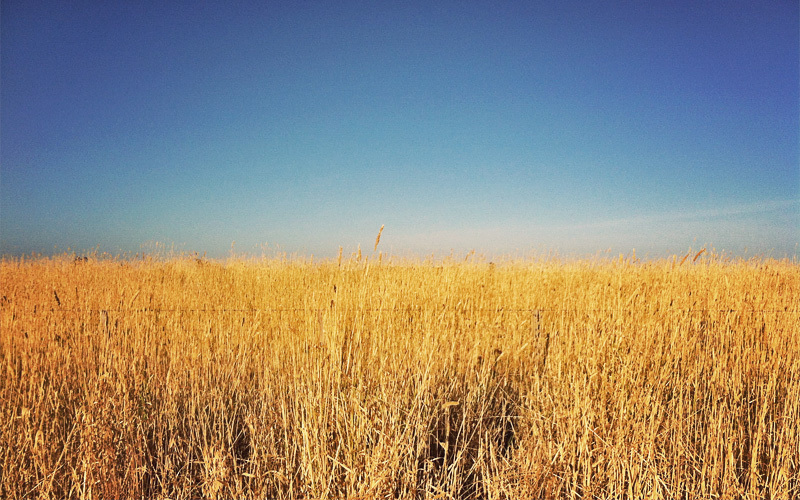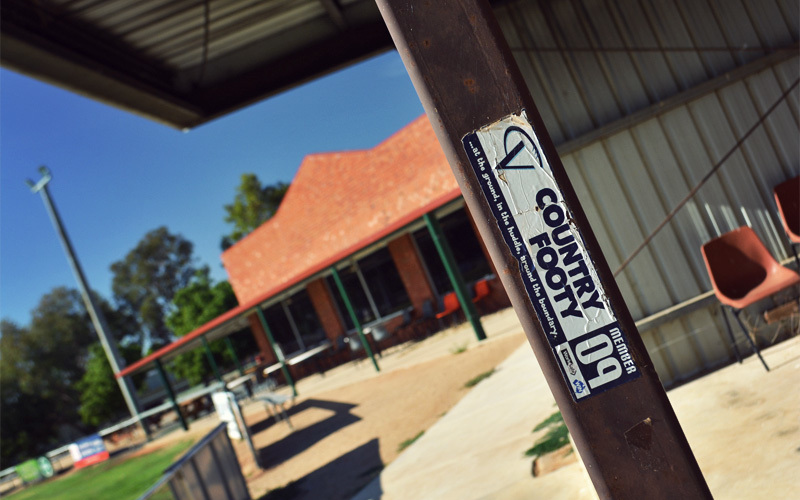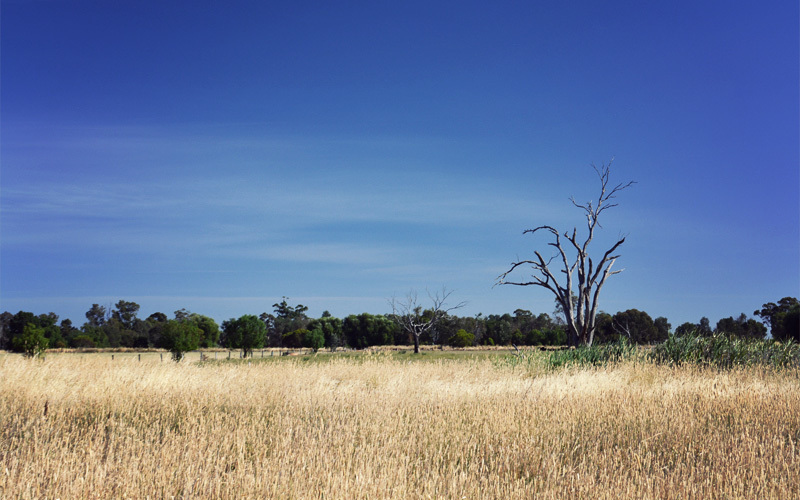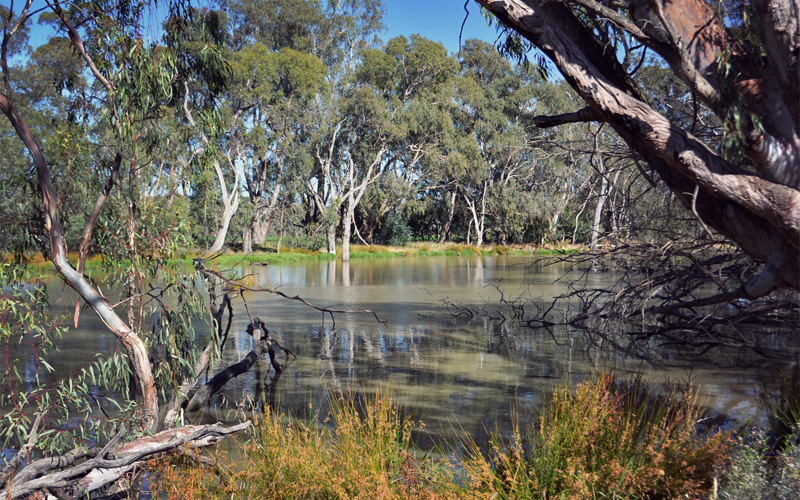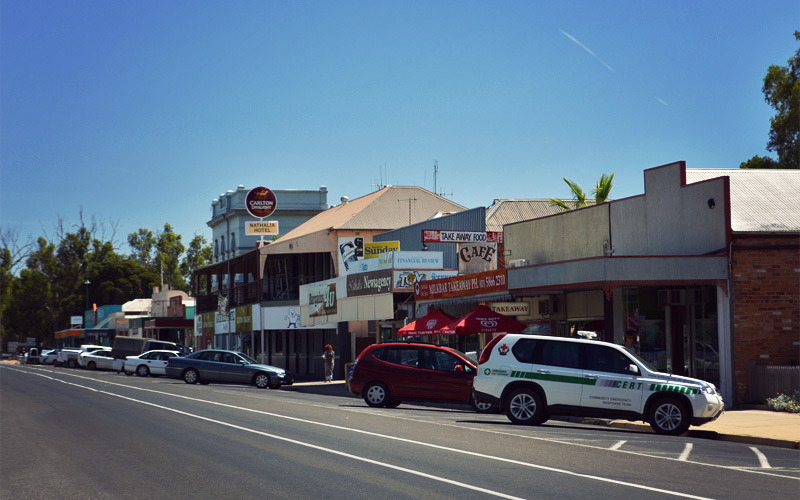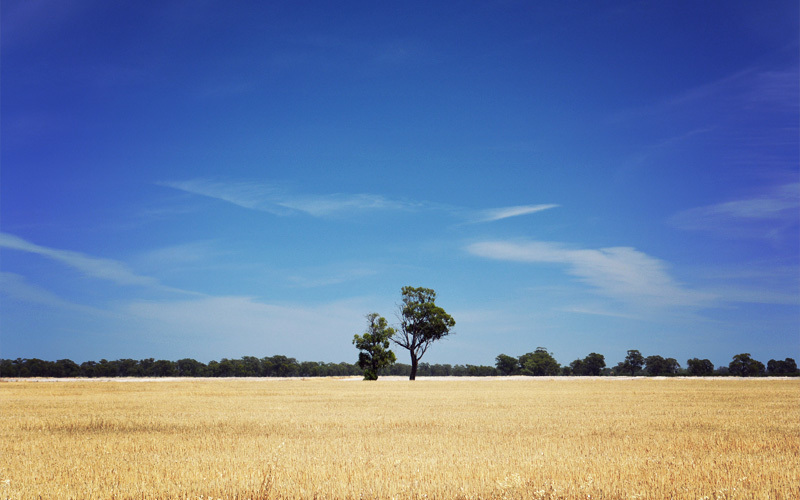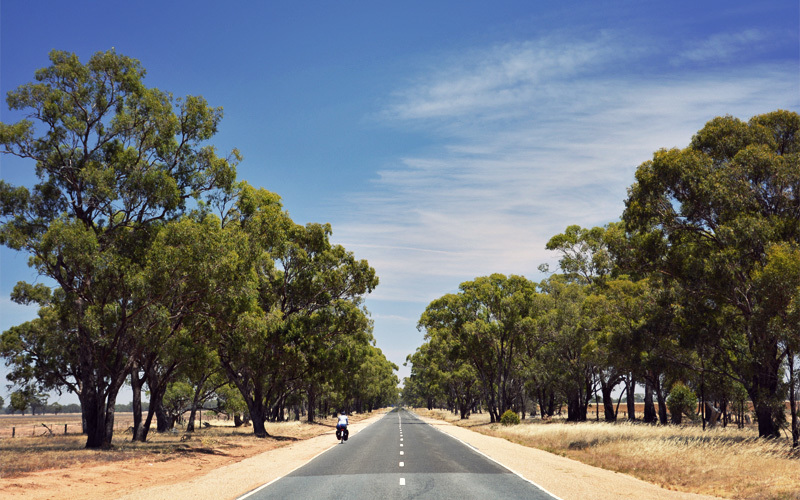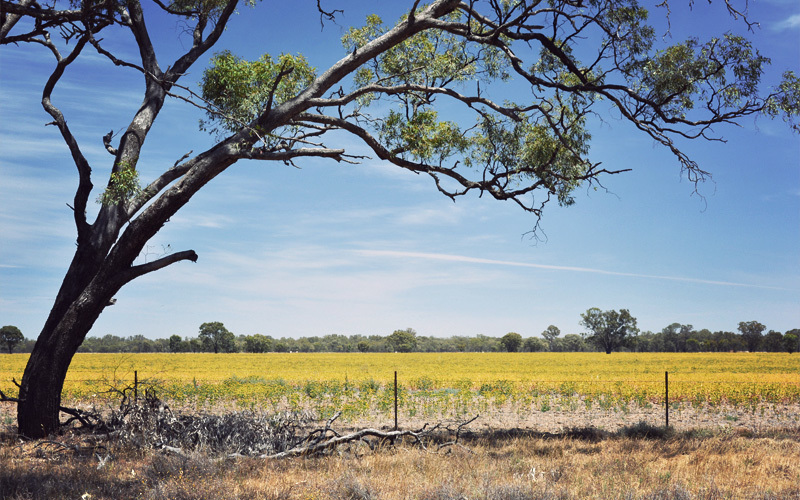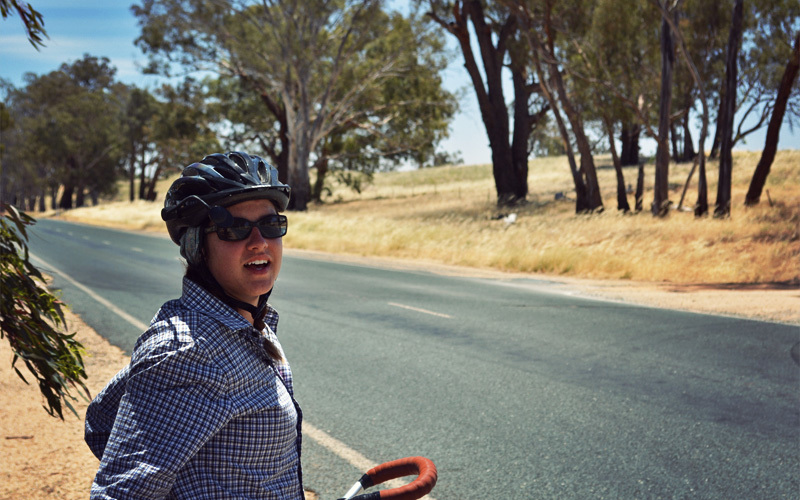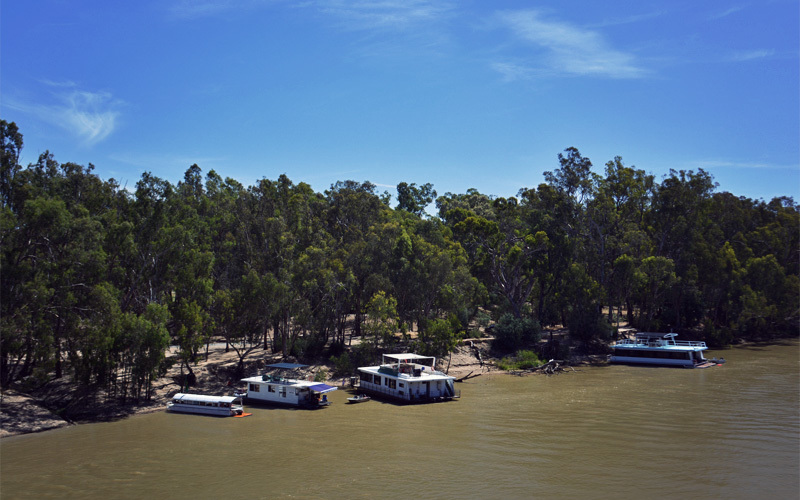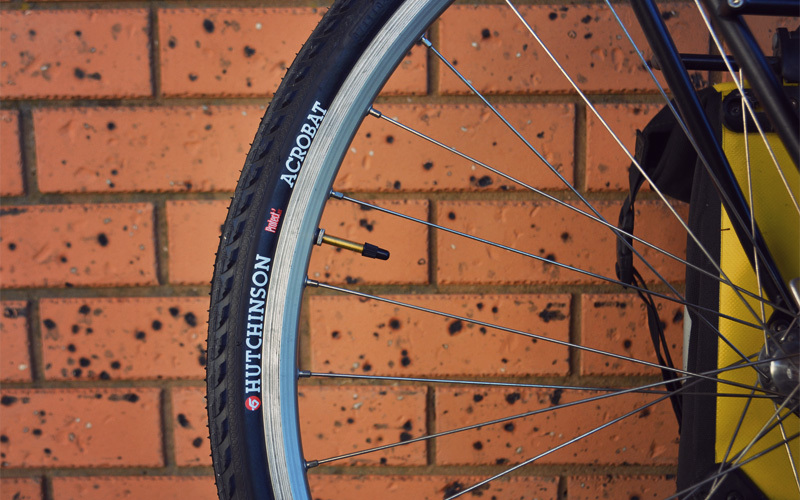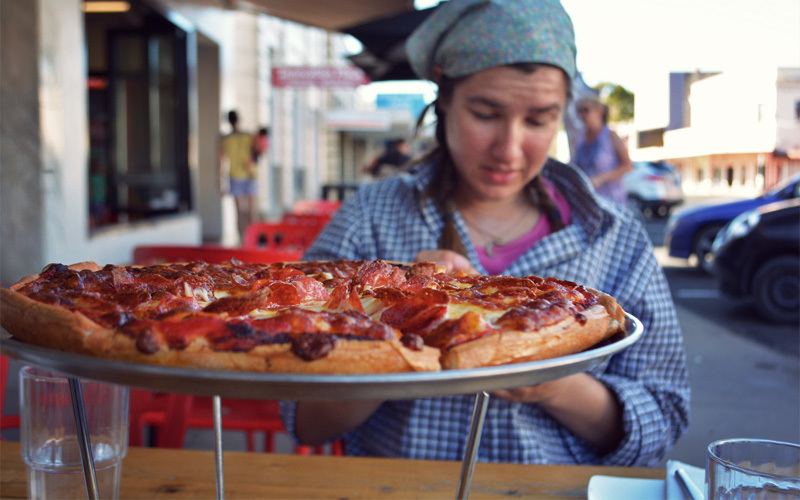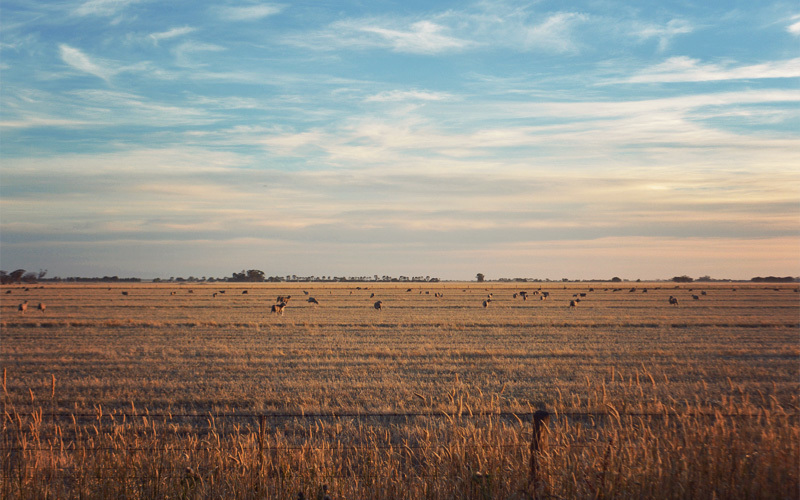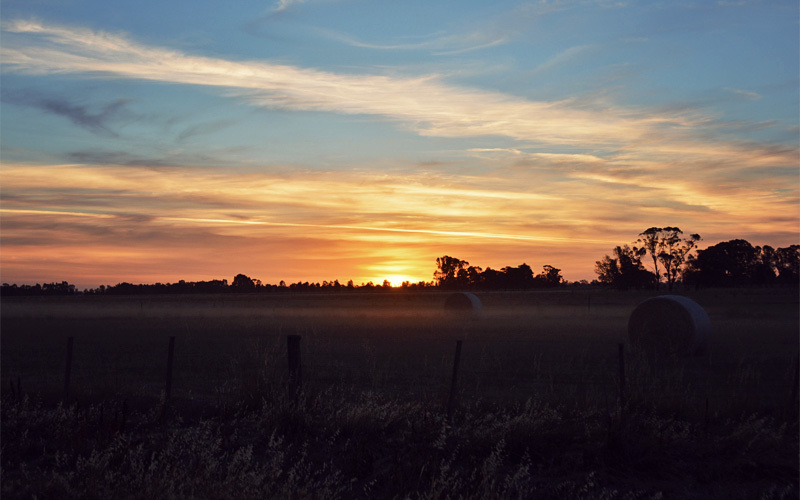December 31, 2014
Day 127: Katunga, VIC to near Lockington, VIC
The first thing I do after I crawl out of the tent is squeeze my tires. The back is solid, the front is soft. Shit. We try to be optimistic about the situation, thinking that maybe because the tube was small and a tight fit that it stretched and settled overnight and that it just needs more air to fill the new-found volume. But the more realistic answer is that it has another puncture, and that some subtle change in the landscape has brought us into country where tiny bits of sharpness shed off an unknown kind of plant and blow onto the road, where three of them have managed to find a thin spot in my tires in the past twenty-four hours.

| Heart | 0 | Comment | 0 | Link |
Worried about finding ourselves stranded and tubeless, we continue on in the warm glow of the early morning light, past sod farms, the silent flow of irrigation canals, and pelicans that leap into flight as we approach. As we head down the kind of roads that make me want to write in cliches like flat as a table and straight as an arrow, we talk about how in the future, when we run out of coal and oil and natural gas, no source of energy will be wasted, ever. The demand for alternate kinds of power will be so strong that people will have fart tubes hooked up to their butts to harness the natural energy, which is a scenario in which we both stand to become very rich.
In Waiia we stand around and eat bananas and granola bars, and watch as a male quail follows a female around doing some sort of mating call and dance. Despite all the ruffling of feathers and hooting and hollering, she has no response other than to walk away. When we look over a few moments later we see they've turned their attention to eating instead, as if it's Friday night and they're a couple that's been married for twenty years. Beyond town we cycle along the oxbow of a river, shaded by the trees, the weather around us perfect, and the air present but no longer turning every mile into a struggle. At least twenty flies sit on each of our backs as we pedal, waiting to jump off and swarm our faces the moment we stop moving. I pull off the road and pump the front tire every ten miles to keep us going until whenever the next bike shop with the right kind of tubes might appear. With all of the businesses around here in the middle of their nonsensical holiday hours, it could be hours or it could be days.
The towns of Katunga, Waiia, and then Nathalia all leave us with a similar impression. They're small towns but they're healthy towns, not burdened with blocks of empty storefronts nor lined with rundown homes. The streets and parks and schools are in good shape. At the sports ovals at the edge of town, where the locals play cricket and rugby, the grass is healthy and green and the banners advertising local businesses that hang off the fence surrounding the pitch are big and bright and clean. In Nathalia, the biggest of the three, the cafes, bakeries, clothing stores, and car repair shops all seem healthy and profitable. We guess that their proximity to the Murray River and the continued existence of small family farms in the surrounding countryside is what helps keep them alive and thriving, but we don't know this for sure. What I feel more certain about is that this is what small town America used to look and smell and sound like, before factory farms rolled in, before the fishing and forestry industries became a shell of their former selves, before young people decided to leave the country for the cities or the suburbs, before manufacturing jobs were shipped overseas, never to return. And there's something deeply sad about that, because these river valley towns feel safe and welcoming and just simply good.
The road beyond Nathalia is quintessential rural Australia. It runs dead straight, has no rise higher than about ten feet, and the boughs of old gum trees come together above the pavement and cast intricate patterns of shadow, even when the sun sits at the highest point of its arc. And as is so typical of this part of the country, cows and sheep lie beneath the trees in some of the fields that parallel the road, but most fields sit fallow and empty except for the bugs and the birds and the rabbits. There are rusted gates that sag on their hinges, hay lofts with no hay stacked beneath their sheet metal roofs, and empty green cans of Victoria Bitter beer in the piles of leaves and sticks and dead grass in the ditch next to the road. We imagine that years from now when we think back on our time in New South Wales and Victoria, after the details of the days have long since faded from our memories, the blending and melding of the bits and pieces that are left will come together in a scene that looks just like this.
But today we gear down and crank hard. There is one bike shop in Echuca that might have the spare tubes I need, but they close at 5:30 today and won't be open tomorrow because it's the New Year's holiday, and information about shops beyond Echuca is scarce. We have to do our best to get there, get tubes, and reduce the chance of getting stuck in the middle of nowhere during the intense heat wave that's only a few days away. Our route eventually takes us down a north-south highway filled with cars, trucks towing trailered fishing boats, and semis long enough they can almost be called road trains. This is complicated by the shoulder, which is narrow with a wandering edge and a three-inch dropoff to the shoulder beyond, as well as the drivers that honk, the passengers that yell from out open windows, and the fact that we have to stop every three miles to keep my front tire full of air.
I almost dump the bike as I make a hard right turn across the road that fronts the bike shop, because that's the exact moment the front tube decides it can take no more and in an instant turns the tire to a pile of rubbery squish. This good luck — that the tire made it exactly as far as I needed it to — is followed in short order by the news that the shop has a pair of 700x32 cyclocross-style tires that will fit with the narrow fenders I use. They're also highly puncture resistant and should keep me rolling on to Perth with no worries of a blowout or a sidewall implosion. This had become a legitimate concerns in the last couple of weeks as the cheap Bontrager tires I've been cruising on since we left Portland almost 4,000 miles ago began to look more and more haggard.
We still feel fried from the ride into town, so we grab a pizza. We check out camping options on our phones while we eat, but they're all impossibly overpriced. And of course all of them also have the same fundamental flaw: they're located in Echuca, which has tripled in size thanks to all of the holiday tourists, and looks like it will be a loud and drunken disaster as the New Year's Eve partying wears on.
And yet we give one of them a shot, because we're that worn down, and because the motels that aren't booked up are charging $150 per night or more. As we roll up the driveway, we see each square foot of grass or dirt or gravel filled with some kind of tent, caravan, travel trailer, camper van, or full-sized RV. It's crawling with screaming kids and disinterested parents. Every other person we see walks around with horrible bright red sunburned arms.
Kristen walks into the office and makes her pitch to the sour-faced woman behind the desk.
"Hi, my boyfriend and I are cycling and we didn't expect to end up here. We've had a couple of flat tires today and we just need a place to set up our tent for the night. Do you have anything open?"
"No, we're completely full," says the grump in the polo shirt with so little remorse that it borders on pleasure.
"Oh, not even a little patch of grass? We'll pay the same price and..."
"We've been booked for 12 months," interrupts the entirely unsympathetic holiday park villain, in this I-can't-believe-you're-really-that-dumb kind of voice, as the fluorescent light above glints off the rectangular plastic name plate pinned to the upper right side of her chest.
And that's the end of that.
We don't start riding out of town until 7:30, with the sun already very low in the sky. It means that for the second night in a row we find ourselves in a race against darkness, with no known place to sleep for the night. We raise a pair of middle fingers to Echuca as the last of the tract houses give way to small cattle farms and we shoot off into the countryside. The air is cool and the roads empty, and the only sounds are the crickets, the sheep, the light metallic crunching of our chains, and the wind passing over our ears at exactly the speed we're traveling. Soon we trade sealed roads for gravel and head toward the west under the pastel shades of the year's last sunset.

| Heart | 1 | Comment | 0 | Link |
When no structure appears, when we find no patch of woods, and when all of the paddock gates we come to are locked, we choose not to ride in the dark and instead set up the tent in the forty-foot buffer of yellow grass that separates the fence line and a little used dirt side road. Inside, we watch the light of the moon reflect off our bikes as they lean against the barbed wire, see headlights crawl along roads many miles to the north, and listen to the voices of people and the barking of dogs located more than half a mile away that reach our tent because the air is so still. Even though we're both tired after two long and sometimes frustrating days of riding, we feel great satisfaction at having not let Echuca beat us, at having fixed my tire problems, and at spending the last night of what has been a remarkable 2014 out in the middle of nowhere in Australia, together and happy and content.
Today's ride: 73 miles (117 km)
Total: 3,912 miles (6,296 km)
| Rate this entry's writing | Heart | 3 |
| Comment on this entry | Comment | 0 |
